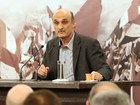The United States expressed deep skepticism Tuesday about suggestions by Syria's deputy prime minister that the regime was open to discussing Syrian President Bashar Assad's resignation.
"We saw the reports of the press conference that the deputy prime minister gave. Frankly, we didn't see anything terribly new there," State Department spokeswoman Victoria Nuland said.
 Full Story
Full Story
The Syrian National Council, Syria's main opposition group is studying the formation of a transitional government, its leader Abdel Basset Sayda said Tuesday.
"We are currently studying the formation of a transitional government," Sayda said after meeting French President Francois Hollande in Paris against a background of hints from the Syrian regime that President Bashar Assad could soon step down.
 Full Story
Full Story
The conflict between opposition fighters and regime forces has turned Syria into one of the world's worst humanitarian crises, exacerbated by attacks on aid workers, U.S. officials said Tuesday.
"There are 2.5 million people in need of aid now inside Syria, and 1.2 million have been displaced from their homes, so on that scale it's right up there with the worst crises in the world today," said David Robinson, a top official at the State Department's Bureau of Population, Refugees and Migration.
 Full Story
Full Story
The Islamic personalities of the northern city of Tripoli announced on Tuesday that an agreement had been reached with the residents of Bab al-Tabbaneh to implement an immediate ceasefire in the clashes that had been raging with the Jabal Mohsen neighborhood since Monday.
MP Mohammed Kabbara also condemned after the meeting the “army’s random gunshots at some innocents.”
 Full Story
Full Story
Lebanese Forces leader Samir Geagea criticized on Tuesday the Syrian regime’s plans to issue arrest warrants against various Lebanese figures, deeming such a step as “laughable.”
He said before an emigrant delegation at his Maarab residence: “The regime is not aware that it is no longer a state. We don’t consider it to be a state.”
 Full Story
Full Story
A top Syrian minister on Tuesday held out the prospect of strongman Bashar Assad stepping down as part of a negotiated settlement to 17 months of bloodshed that activists say has killed 23,000.
The comments from Syria's Deputy Prime Minister Qadri Jamil came following talks with Foreign Minister Sergei Lavrov and other Moscow officials who are keen to keep their sway over the Soviet-era ally in case of the fall of Assad.
 Full Story
Full Story
Russia on Tuesday defended its ally Syria against the threat of outside interference after U.S. President Barack Obama called the use of chemical weapons by the regime a "red line".
"There should be no interference from the outside," Foreign Minister Sergei Lavrov said a day after Washington raised the possibility of unilateral military action.
 Full Story
Full Story
Head of the Free Syrian Army Colonel Riad al-Asaad accused on Tuesday the Syrian regime of being behind the claim that a member of al-Meqdad clan is being held captive by the FSA.
He said: “This is one of the regime’s games to create strife and instability in Lebanon.”
 Full Story
Full Story
Syria's rebels control almost two thirds of the northern city of Aleppo, a top Free Syrian Army commander said on Tuesday, in a claim denied by a security source in Damascus.
"We now control more than 60 percent of the city of Aleppo, and each day we take control of new districts," Colonel Abdel Jabbar al-Okaidi told Agence France Presse by telephone.
 Full Story
Full Story
Russian Foreign Minister Sergei Lavrov told a senior visiting Syrian minister on Tuesday that the regime's current efforts to end 17 months of violence were insufficient and required further effort.
"From what we see in Syria, it seems that this is not enough," the RIA Novosti news agency quoted Lavrov as telling Syria's Deputy Prime Minister Qadri Jamil at the start of their talks.
 Full Story
Full Story



